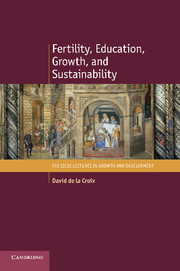Book contents
- Frontmatter
- Contents
- List of figures
- List of tables
- List of symbols
- List of definitions
- List of propositions
- Introduction
- PART ONE DIFFERENTIAL FERTILITY
- PART TWO EDUCATION POLICY
- 4 Education policy: private versus public schools
- 5 Education politics and democracy
- 6 Empirical evidence
- PART THREE SUSTAINABILITY
- Bibliography
- Author index
6 - Empirical evidence
from PART TWO - EDUCATION POLICY
Published online by Cambridge University Press: 05 December 2012
- Frontmatter
- Contents
- List of figures
- List of tables
- List of symbols
- List of definitions
- List of propositions
- Introduction
- PART ONE DIFFERENTIAL FERTILITY
- PART TWO EDUCATION POLICY
- 4 Education policy: private versus public schools
- 5 Education politics and democracy
- 6 Empirical evidence
- PART THREE SUSTAINABILITY
- Bibliography
- Author index
Summary
The theory developed in Chapter 5 makes predictions about how the quality and extent of private and public schooling are determined at the aggregate level, and about how schooling and fertility choices vary across households within a given political entity. In this chapter,we compare these predictions to data.We start by focusing on state-level variation in the extent and quality of public education in the United States. This setting is well suited to examining the predictions of our theory for democratic countries, since all US states operate within the same overall political framework, while exhibiting considerable variation in schooling policies as well as the distribution of income. Moreover, we are able to link state-level evidence to household data from the US Census to assess the micro implications of our theory.We then extend the analysis to cross-country data, which allows us to probe the theory's predictions for non-democratic countries. Here we use data from the OECD and the World Bank on public and private education spending, as well as micro data from the OECD Program for International Student Assessment (PISA).
Inequality, fertility, and schooling across US states
Our model predicts that in a democracy, the choice of public versus private schooling and the level of funding of public schooling are driven by income inequality (see Proposition 5.3). In particular, a state with higher income inequality should exhibit a higher share of private schooling, lower overall spending on public schooling, but higher public education spending per student.
- Type
- Chapter
- Information
- Fertility, Education, Growth, and Sustainability , pp. 130 - 150Publisher: Cambridge University PressPrint publication year: 2012



